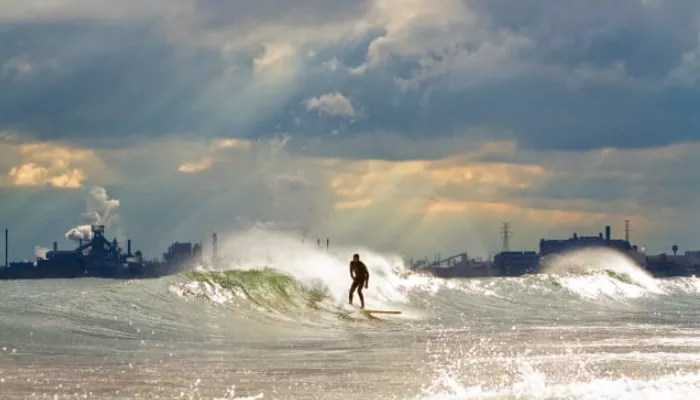Chicago, IL – Surfing in Chicago is no easy feat, but thanks to the tireless efforts of local activists and the Surfrider Foundation, waves on Lake Michigan are now more accessible than ever.
Chicago’s surfing community has long been defined by resilience, with local surfers braving the harsh winters and short-period wind swells that characterize the Great Lakes. Yet, until 2009, Chicago remained the only major city on the Great Lakes to prohibit surfing. The ban on surfing, which lasted over two decades, was a point of contention for local surf enthusiasts who argued for their right to ride the waves along the city’s iconic shoreline.
The push to overturn the ban began in 2006 when Jack Flynn, a Chicago graphic designer, was ticketed for surfing off 57th Street Beach. This incident sparked outrage and mobilized local surfers, including Vince Deur, co-chair of the Surfrider Foundation’s Lake Michigan Chapter, to launch the “Surfing Is Not A Crime” campaign. Deur, along with other activists, argued that surfing posed no danger to the public and was a form of recreation that people cherished. “We’re not talking about endangering people’s lives,” Deur said at the time. “This is recreation people love and enjoy.”
In 2009, after years of lobbying and organizing, the Surfrider Foundation succeeded in getting the 20-year ban lifted. The Chicago Park District agreed to allow surfing at select beaches along Lake Michigan, including Montrose Beach and 57th Street Beach, during the summer season (Memorial Day to Labor Day). During the off-season (from Labor Day to Memorial Day), surfing was permitted at Montrose, 57th Street, Rainbow Beach, and Osterman Beach.
Despite this victory, the fight for surfing access is ongoing. In the summer of 2023, local surfers encountered barriers when they were prevented from surfing at Montrose Beach. The Surfrider Foundation’s Chicago Chapter quickly intervened, reminding the park district of the city’s existing surf access policy. The park district responded by reaffirming the policy, allowing surfers to continue enjoying the waves at Montrose Beach.
While this issue was resolved, it highlights an ongoing challenge: ensuring that surf access remains consistent and clear. Surfrider Foundation representatives continue to work with the city of Chicago to establish a formalized, written policy within the park district’s code, guaranteeing free and uninterrupted access to all Chicago surfers.
The victory in Chicago is a testament to the power of grassroots activism and the Surfrider Foundation’s ability to protect surf spots across the country. As they work to preserve and expand surf access, the foundation reminds us that waves, while natural, require constant care and advocacy to keep them accessible for all.
The effort to maintain Chicago’s surf scene may take grit, but for local surfers, it’s a battle worth fighting.
Related topics
- Surfrider Foundation Secures Protection for Iconic Hawaiian Wave
- South Korea to Ban Drunk Surfing, Imposing $685 Fine
- Kelly Slater’s Freaks of Nature: The Ultimate Skin Care for Surfer

